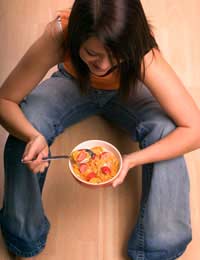Iron and Folic Acid in Pregnancy

Ensuring you get enough nutrients during pregnancy is essential for both you and your growing baby. Iron and folic acid are two of the key nutrients you need, but how much should you be getting and what role do they play?
Iron is required to help the red blood cells transport oxygen around the body. During pregnancy, there's an extra demand for iron and other vitamins, which are needed for women, the unborn baby and the placenta. Many women find their levels of iron depleting during this time - which can cause anaemia.
Anaemia is especially common in women carrying twins, in those having pregnancies close together, in vegetarians, if you've had a loss of blood due to piles or stomach ulcers and if you haven't got enough folic acid in your diet. Anaemia can make you feel really tired, look pale, experience dizziness, breathlessness and palpitations. In severe cases, it can cause chest pain and headaches.
During pregnancy, your levels of iron should be checked at regular intervals. If it's found to be particularly low, you may be prescribed an iron supplement. However, you can boost your iron levels through eating iron-rich foods.
Foods rich in iron include:
- Lean red meat, such as pork, beef or lamb
- Eggs
- Dark poultry
- Sardines
- Cashew nuts
- Wholemeal bread
- Iron-fortified cereals
- Lentils
- Chick peas
- Baked beans
- Leafy green vegetables
- Dried fruit
- Baked potatoes
- Sunflower seeds
Folic Acid
Folic acid is one of the most important nutrients to have during the first trimester of pregnancy and before conception, as women deficient in folic acid have a greater risk of having a baby with a neural tube defect such as spina bifida.Ideally, folic acid supplements should be taken from the time you're trying to conceive (if it's a planned pregnancy) to until the end of week 12 of your pregnancy. The recommended daily supplement dose is 400mcg, but women who've had a history of neural tube defects are usually prescribed a dose of 5mg. In addition to taking folic acid supplements, you should try and eat as much as you can each day, by eating plenty of foods rich in folic acid.
Good folic acid foods to eat include:
- Green leafy vegetables
- Citrus and kiwi fruit
- Peas
- Beans
- Cauliflower
- Fortified breakfast cereals
- Fortified bread
- Other fortified foods
It's useful to note that folic acid is lost when food is cooked, so it's advisable to only boil vegetables for a short period of time or steam them, to retain as many nutrients as possible.


Re: Ultrasounds - What is EFBW and GMS?
My wife is 32.6 weeks ...and the babys weight is 1971gms...is that normal or not...please reply me.....
Re: Ultrasounds - What is EFBW and GMS?
my 18th week and baby weight 252 it is gud or bad...please tell me....
Re: Ultrasounds - What is EFBW and GMS?
Hello!i have 21 weeks and 4 days pregnancy.. and my EFBW is 430gms.. is that normal?? Will my baby healthy or not??
Re: Abdominal and Pelvic Pain During Pregnancy
Left pelvic pain, backpain pregnency positive' is any problem, already ectopic happen
Re: Ultrasounds - What is EFBW and GMS?
My wife is 21 week 2 day . In scan report EFRW 415 GM is normal or not . Can you please help me to know current status of…
Re: Ultrasounds - What is EFBW and GMS?
I am 34.1wks pregnant my baby weight is 2215gm is my baby healthy
Re: Ultrasounds - What is EFBW and GMS?
My wife is 37weeks 5days pregnant E.F.B.W - 3010 grams how is she
Re: Ultrasounds - What is EFBW and GMS?
I am pregnant of 36 week 2 days and my EFBW is 1949 is it normal..?
Re: Ultrasounds - What is EFBW and GMS?
i had my ultrasound rhis sept 19 i wonder what is rhis number for efbw 2336 stands fir can you please give me an idea…
Re: Ultrasounds - What is EFBW and GMS?
my wife is 16.2 weeks and done early tiffa scan. E/O an elongated anechoic lesion with minimal internal echogencity…